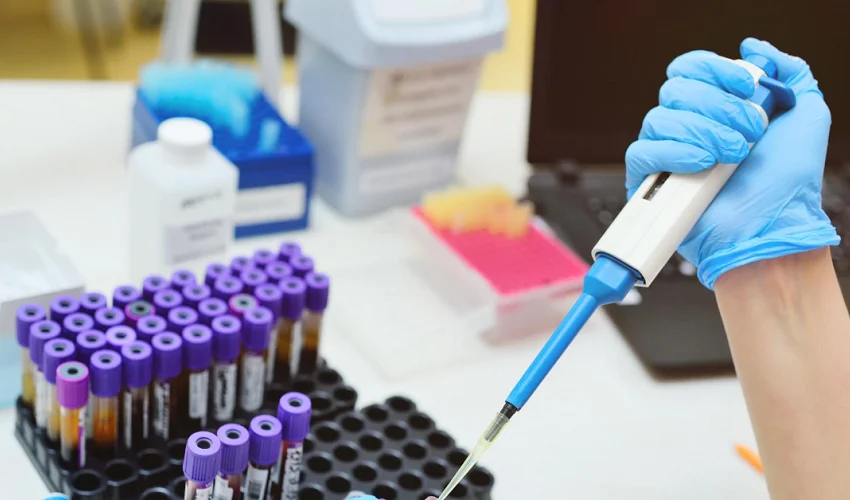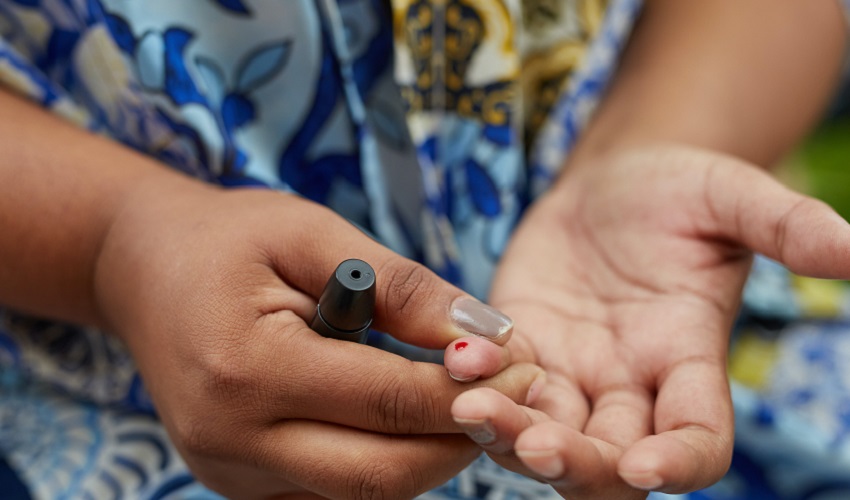Introduction to glucometers and lab tests
Glucometers and lab tests play a crucial role in the management of diabetes. They are both used to measure blood glucose levels, but there are important differences between the two. Glucometers, also known as blood glucose meters, are portable devices that allow individuals with diabetes to monitor their blood sugar levels at home. They provide instant results and are convenient for daily use. On the other hand, lab tests are conducted in a medical laboratory and provide more accurate and comprehensive information about blood glucose levels. They are usually performed less frequently and require a healthcare professional to draw blood. Understanding the variances between glucometers and lab tests is essential for diabetics to effectively monitor and manage their condition.
Importance of accurate blood glucose measurement
Accurate blood glucose measurement is of utmost importance for individuals with diabetes. It allows them to effectively manage their condition and make informed decisions about their treatment and lifestyle. The difference between glucometer readings and lab test results can have significant implications for diabetics. Understanding these variances is crucial in ensuring accurate monitoring and control of blood glucose levels. By recognizing the importance of accurate blood glucose measurement, individuals with diabetes can take proactive steps to maintain their health and well-being.
Understanding the variances between glucometers and lab tests
Understanding the variances between glucometers and lab tests is crucial for diabetics. While both methods are used to measure blood glucose levels, there can be significant differences in the results they provide. Glucometers are portable devices that allow individuals to monitor their blood sugar levels at home or on the go. However, these devices may not always be as accurate as lab tests, which are conducted in a controlled environment by trained professionals. Factors such as user error, device calibration, and sample quality can contribute to variations between glucometer readings and lab test results. Therefore, it is important for diabetics to understand the potential discrepancies and consult with their healthcare providers to ensure accurate monitoring and management of their condition.
Glucometers: How They Work
Principles behind glucometer technology
Glucometer technology is based on the principles of electrochemistry and biochemistry. The device measures the glucose levels in the blood by detecting the electrical current generated when glucose reacts with an enzyme called glucose oxidase. This reaction produces gluconic acid and hydrogen peroxide, which are then converted into an electrical signal. The glucometer then displays the glucose concentration on its screen. This technology allows diabetics to monitor their blood sugar levels conveniently and accurately without the need for frequent visits to a laboratory for lab tests.
Types of glucometers available in the market
There are several types of glucometers available in the market for diabetics to monitor their blood glucose levels. One type is the traditional handheld glucometer, which requires a small blood sample to be placed on a test strip and inserted into the device. These glucometers provide accurate readings and are easy to use. Another type is the continuous glucose monitoring system (CGM), which consists of a small sensor inserted under the skin that measures glucose levels throughout the day. CGMs provide real-time data and can alert the user to high or low glucose levels. Some glucometers also come with additional features such as Bluetooth connectivity, allowing users to sync their data with a smartphone app for easy tracking and analysis. With the wide variety of glucometers available, diabetics have options to choose the one that best suits their needs and lifestyle.
Pros and cons of using glucometers for blood glucose measurement
Glucometers have become an integral tool for diabetics to monitor their blood glucose levels conveniently at home. One of the main advantages of using glucometers is the ability to obtain immediate results, allowing individuals to make timely adjustments to their diet and medication. Additionally, glucometers are portable and compact, making them easy to carry around and use whenever needed. They also require only a small blood sample, reducing the discomfort associated with traditional lab tests. However, it is important to acknowledge some limitations of glucometers. The accuracy of glucometer readings can vary depending on factors such as user error, temperature, and humidity. Furthermore, glucometers may not always provide the same level of accuracy as lab tests, which can lead to discrepancies in the measurement of blood glucose levels. Despite these limitations, glucometers offer convenience and accessibility for diabetics in managing their condition.
Lab Tests: The Gold Standard
Different types of lab tests for measuring blood glucose
There are several different types of lab tests that can be used to measure blood glucose levels. The most common test is the fasting plasma glucose test, which measures blood sugar levels after a period of fasting. Another test is the oral glucose tolerance test, which measures how the body processes sugar over a period of time. A random plasma glucose test can also be done to measure blood sugar levels at any time throughout the day. Additionally, the hemoglobin A1C test provides an average of blood sugar levels over a period of two to three months. These lab tests are important for diabetics to monitor their blood glucose levels and make informed decisions about their treatment and management of the condition.
Accuracy and reliability of lab tests
When it comes to managing diabetes, accurate and reliable lab tests play a crucial role. These tests provide valuable information about a person’s blood glucose levels, allowing healthcare professionals to make informed decisions regarding treatment and medication adjustments. Unlike glucometers, which can sometimes provide inconsistent readings, lab tests are conducted in controlled environments by trained professionals, ensuring accuracy and reliability. Lab tests also have the advantage of being able to measure other important parameters, such as HbA1c levels, which provide a long-term assessment of blood sugar control. Therefore, relying on lab tests for monitoring and managing diabetes is essential for maintaining optimal health and well-being.
Factors that can affect lab test results
There are several factors that can affect lab test results. One of the main factors is the accuracy and precision of the equipment used in the lab. If the equipment is not calibrated properly or if there are any malfunctions, it can lead to inaccurate test results. Another factor is the proficiency and experience of the lab technicians. Skilled technicians who follow proper procedures and handle the samples correctly are more likely to produce reliable results. Additionally, external factors such as the patient’s preparation for the test, including fasting or avoiding certain medications, can also impact the results. It is important for healthcare providers to be aware of these factors and take them into consideration when interpreting lab test results for diabetic patients.
Variances Between Glucometers and Lab Tests
Factors contributing to differences in blood glucose readings
There are several factors that can contribute to differences in blood glucose readings between glucometer devices and lab tests. One factor is the calibration of the glucometer, as it needs to be regularly calibrated to ensure accurate readings. Another factor is the timing of the blood glucose measurement, as levels can fluctuate throughout the day. Additionally, the quality of the testing strips used in the glucometer can also impact the accuracy of the readings. It is important for diabetics to be aware of these factors and work closely with healthcare professionals to interpret their blood glucose results effectively.
Comparing accuracy and precision of glucometers and lab tests
When it comes to comparing the accuracy and precision of glucometers and lab tests, it is essential to understand the variances for diabetics. Glucometers are handheld devices that measure blood glucose levels, providing instant results. While they are convenient and easy to use, they may not always be as accurate as lab tests. Lab tests, on the other hand, are conducted in a controlled laboratory setting and are known for their high level of accuracy. They provide a comprehensive analysis of blood glucose levels, taking into account various factors that may affect the results. Therefore, it is important for diabetics to be aware of the differences between glucometers and lab tests and to consult with their healthcare professionals to determine the most reliable method for monitoring their blood glucose levels.
Understanding the acceptable level of variance for diabetics
Understanding the acceptable level of variance for diabetics is crucial in managing their condition effectively. Diabetics rely on both glucometer readings and lab tests to monitor their blood sugar levels. While glucometers provide convenience and instant results, they may have a margin of error compared to lab tests. It is important for diabetics to understand the acceptable level of variance between these two methods of testing. This knowledge allows them to make informed decisions about their treatment and adjust their medication or lifestyle accordingly. By understanding the variances between glucometer readings and lab tests, diabetics can ensure accurate blood sugar monitoring and maintain optimal health.
Implications for Diabetics
Impact of variances on diabetes management
The impact of variances between glucometer readings and lab test results can have significant implications for diabetes management. Glucometers, while convenient and easily accessible, may not always provide accurate and precise readings compared to lab tests. These variances can lead to misinterpretation of blood glucose levels, resulting in incorrect insulin dosages or dietary adjustments. For diabetics, accurate monitoring of blood glucose levels is crucial in maintaining stable and healthy blood sugar levels. Therefore, understanding the differences and potential variances between glucometer readings and lab test results is essential in effectively managing diabetes and making informed decisions about treatment and lifestyle choices.
Importance of regular lab tests for monitoring blood glucose
Regular lab tests for monitoring blood glucose are of utmost importance for individuals with diabetes. These tests provide valuable information about the level of glucose in the blood, helping to assess the effectiveness of diabetes management strategies. By regularly monitoring blood glucose through lab tests, diabetics can identify any fluctuations or abnormalities in their blood sugar levels, allowing them to make necessary adjustments to their treatment plans. Lab tests also help healthcare professionals to accurately diagnose and classify diabetes, as well as determine the appropriate course of treatment. Additionally, regular lab tests enable diabetics to track their progress over time and evaluate the impact of lifestyle changes, medication adjustments, and other interventions on their blood glucose control. Therefore, it is crucial for individuals with diabetes to prioritize regular lab tests as an integral part of their overall diabetes management plan.
Tips for optimizing the use of glucometers
Tips for optimizing the use of glucometers
To ensure accurate and reliable results when using glucometers, there are several tips that can be followed. Firstly, it is important to always wash and dry your hands thoroughly before testing your blood sugar levels. This helps to remove any dirt, oils, or residue that may interfere with the accuracy of the readings. Additionally, it is recommended to use a new lancet and test strip for each blood sugar test to minimize the risk of contamination. It is also important to properly calibrate your glucometer according to the manufacturer’s instructions to ensure accurate readings. Lastly, it is advisable to keep a record of your blood sugar readings and any accompanying factors such as food intake or physical activity. This can help identify patterns and trends in your blood sugar levels, allowing for better diabetes management. By following these tips, individuals can optimize the use of glucometers and ensure accurate monitoring of their blood sugar levels.
Summary of key points
The article titled ‘How Much Difference Between Glucometer and Lab Test: Understanding the Variances for Diabetics’ provides valuable insights into the variations between glucometer readings and lab test results for individuals with diabetes. In the section titled ‘Summary of key points’, the article highlights the main takeaways from the discussion. This summary aims to provide a concise overview of the key findings, enabling readers to grasp the main points without delving into the entire article. By summarizing the key points, readers can quickly understand the differences between glucometer readings and lab test results and their implications for diabetics. This section serves as a useful reference for those seeking a quick understanding of the topic.
Importance of understanding the variances
Understanding the variances between glucometer readings and lab test results is of utmost importance for diabetics. It allows them to make informed decisions about their health and manage their condition effectively. Glucometer readings provide instant feedback on blood glucose levels, while lab tests offer a more comprehensive analysis. By understanding the differences between the two, diabetics can better interpret their readings and take appropriate actions to maintain stable blood sugar levels. This knowledge also helps in identifying any discrepancies or inconsistencies between the glucometer and lab results, enabling diabetics to seek necessary medical interventions if required. Ultimately, understanding the variances empowers diabetics to take control of their health and make informed choices in managing their diabetes.
Future developments in blood glucose measurement technology
Future developments in blood glucose measurement technology are expected to revolutionize the way diabetics monitor their blood sugar levels. With advancements in wearable devices and continuous glucose monitoring systems, individuals will have access to real-time data and personalized insights about their glucose levels. These technologies will not only provide accurate and reliable measurements but also offer convenience and ease of use. Moreover, the integration of artificial intelligence and machine learning algorithms will enable predictive analytics, allowing diabetics to anticipate fluctuations in their blood sugar levels and take proactive measures to manage their condition. Overall, the future of blood glucose measurement technology holds great promise in improving the quality of life for diabetics and empowering them to better manage their health.




